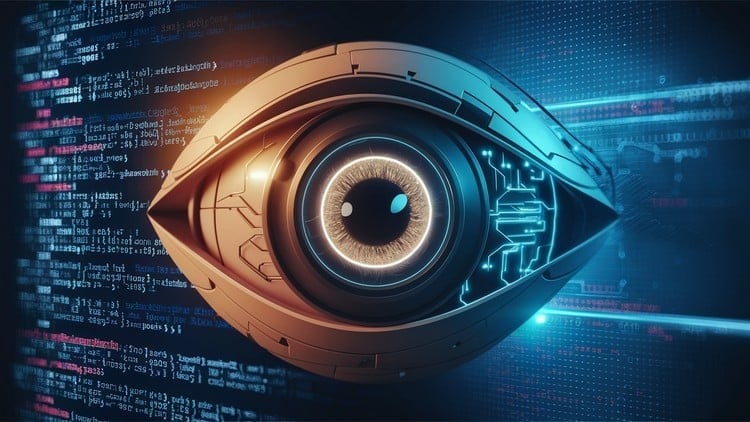
Master Computer Vision & Image Processing: OpenCV, Deep Learning, AI Applications & Real-World Projects
👥 21 students
Add-On Information:
Note➛ Make sure your 𝐔𝐝𝐞𝐦𝐲 cart has only this course you're going to enroll it now, Remove all other courses from the 𝐔𝐝𝐞𝐦𝐲 cart before Enrolling!
- Course Overview
- This certification program offers an intensive, hands-on journey into the dynamic fields of Computer Vision and Image Processing, designed to transform learners into proficient practitioners. It meticulously blends foundational theory with practical, cutting-edge application, ensuring a holistic understanding of how machines interpret visual data. The curriculum covers both traditional image processing techniques and revolutionary advancements by deep learning, providing a comprehensive toolkit for tackling complex visual AI challenges. Participants gain insights into the entire pipeline of developing intelligent vision systems, from data acquisition and preprocessing to model deployment and evaluation.
- The course emphasizes a project-centric learning approach, allowing students to apply concepts directly to real-world scenarios. It delves deep into core algorithms for image understanding, object detection, segmentation, and tracking, utilizing industry-standard libraries and frameworks. By focusing on practical implementations, the program ensures graduates are not just conceptually aware but capable of building robust, scalable computer vision solutions from the ground up. This blend of theory and practice is crucial for anyone aiming to make a significant impact in the rapidly evolving AI landscape.
- Moreover, the program specifically highlights the integration of Artificial Intelligence (AI) principles within computer vision. It explores how various AI paradigms, particularly deep learning, have revolutionized the field, enabling unprecedented accuracy and efficiency in tasks once deemed intractable. Learners will explore architectures like Convolutional Neural Networks (CNNs), Recurrent Neural Networks (RNNs), and advanced object detection models, understanding their underlying mechanics and practical deployment. The course also touches upon ethical considerations and best practices in developing responsible AI vision systems, preparing students for real-world responsibilities.
- Requirements / Prerequisites
- Fundamental Programming Proficiency: A solid understanding of Python programming is essential, including familiarity with data structures, control flow, functions, and object-oriented programming. Python will be the primary language for implementation.
- Basic Mathematical Acumen: Learners should possess a foundational grasp of linear algebra (vectors, matrices, matrix operations), basic calculus (derivatives, gradients), and probability and statistics. These concepts underpin many image processing algorithms and deep learning models.
- Conceptual Understanding of Machine Learning: Prior exposure to basic machine learning concepts, such as supervised vs. unsupervised learning, model training, validation, and evaluation metrics, will be beneficial. It will accelerate the learning process.
- Access to a Computing Environment: A personal computer capable of running modern development environments, ideally with GPU support for deep learning tasks, is highly recommended. Cloud-based GPU resources can also be utilized.
- Skills Covered / Tools Used
- Core Image Processing Techniques: Mastery of image manipulation, enhancement, filtering, morphological operations, geometric transformations, color space conversions, and feature extraction using both classical algorithms and modern libraries.
- OpenCV Library Proficiency: In-depth expertise in leveraging the OpenCV library for a wide array of computer vision tasks, including reading/writing images/videos, manipulating pixel data, applying filters, detecting edges, corners, key points, and performing object detection.
- Deep Learning Frameworks: Practical experience with prominent deep learning frameworks such as TensorFlow or PyTorch (implied), enabling the construction, training, and deployment of complex neural network architectures for vision tasks.
- Advanced Neural Network Architectures: Thorough understanding and implementation of Convolutional Neural Networks (CNNs), Recurrent Neural Networks (RNNs), and state-of-the-art object detection (e.g., YOLO, SSD, Faster R-CNN) and segmentation models.
- Computer Vision Applications: Ability to develop solutions for diverse applications including facial recognition, pose estimation, optical character recognition (OCR), image classification, medical image analysis, autonomous navigation, and industrial inspection.
- Data Preprocessing and Augmentation: Techniques for preparing visual datasets, including normalization, scaling, augmentation strategies, and handling various image formats to optimize model performance and generalization.
- Performance Optimization & Deployment: Strategies for optimizing model inference speed, memory footprint, and understanding deployment considerations for real-time applications and edge devices.
- Benefits / Outcomes
- Certified Expertise: Earn a valuable certification validating comprehensive skills in traditional and deep learning-based computer vision and image processing, significantly enhancing professional credentials.
- Career Advancement & Opportunities: Position yourself for high-demand roles in AI, Machine Learning Engineering, Computer Vision Engineering, Robotics, and Data Science across industries like tech, healthcare, automotive, and security.
- Robust Project Portfolio: Build a strong portfolio through hands-on, real-world projects demonstrating your ability to design, implement, and deploy practical computer vision solutions, making you highly attractive to employers.
- Problem-Solving Acumen: Develop critical thinking and problem-solving skills to effectively analyze visual data challenges and formulate innovative AI-driven solutions.
- Foundation for Research & Development: Gain a solid theoretical and practical foundation to pursue advanced research in computer vision, contribute to cutting-edge AI advancements, or innovate new products and services.
- Stay Ahead of the Curve: Master the latest tools, techniques, and methodologies in computer vision, including deep learning, ensuring you remain competitive and relevant in a rapidly evolving technological landscape.
- PROS
- Comprehensive Skill Set: Covers a broad spectrum from classical image processing to advanced deep learning, ensuring a well-rounded understanding.
- Project-Based Learning: Strong emphasis on real-world projects provides practical experience and builds a compelling portfolio.
- Industry-Relevant Tools: Focuses on widely adopted tools and frameworks like OpenCV and deep learning libraries, preparing students for immediate application in industry.
- High-Demand Field: Equips learners with skills for roles in a rapidly growing and highly sought-after domain.
- Certification Value: A ‘Certified’ course title adds significant weight to professional resumes and LinkedIn profiles.
- CONS
- Demanding Curriculum: The depth and breadth of topics require significant time commitment and dedicated effort to fully grasp and apply the concepts effectively.
Learning Tracks: English,IT & Software,Other IT & Software
Found It Free? Share It Fast!